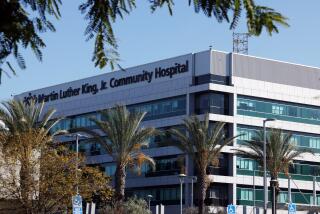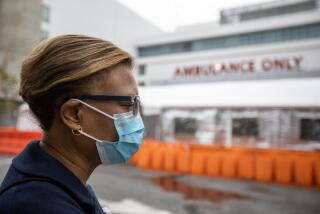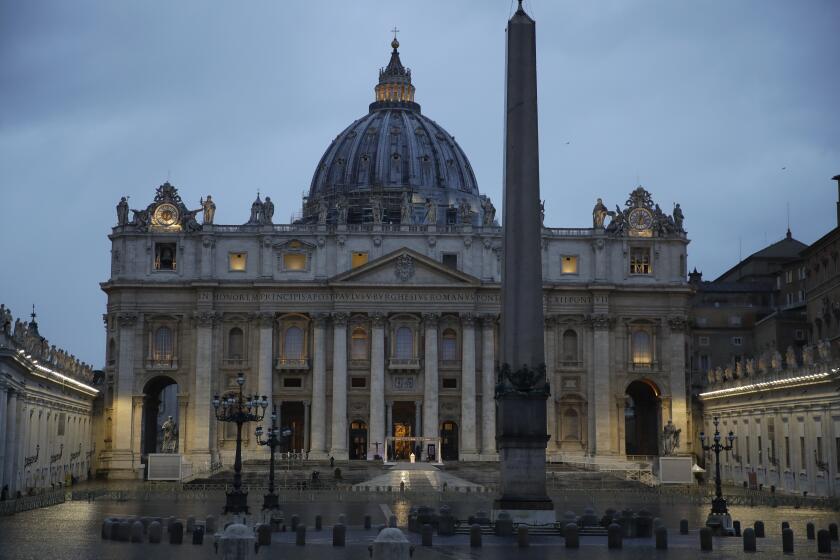Valley Hospital Officials Welcome Bailout : Reaction: But many remain cautious until county plans are finalized.
Private hospital executives in the San Fernando Valley on Friday took a step back from expensive preparations to beef up their emergency rooms for an expected deluge of the poor after a $364-million federal bailout of Los Angeles County’s tattered medical system.
“We have to wait and see how much of a stopgap it is, but we’re breathing easier,” said Dan J. Brothman, president and chief executive officer of West Hills Regional Medical Center.
Private hospital officials had worried that a collapse of the deficit-ridden county’s network of public health clinics would flood their emergency departments with sick people with no medical insurance, forcing some hospitals to close their emergency rooms to survive financially.
Dr. Paul Karis, emergency medical chief at Northridge Hospital Medical Center, said his institution had planned to hire up to three more physicians and up to half a dozen more nurses for its emergency room to cope with the situation. The hospital also planned to expand areas where it handles emergency cases.
Karis said Northridge already had seen a 10% jump in the number of people in its emergency department in recent days, after county health officials began turning away new clinic patients three weeks ago.
The federal bailout, however, “is going to take a lot of the pressure off,” Karis said. He added that the hospital will keep the backup measures in place “in case this doesn’t come true as expected or planned, but I have to say we’re real pleased with the news.”
Brothman said the federal aid had prompted him to reconsider a $100,000 remodeling project to create a “fast track” area at West Hills Regional that would divert patients with minor ailments from his hospital’s emergency department.
But he said he was still concerned about how the federal money would be spent and whether the county Health Services Department would cancel plans to close six of its eight clinics in the Valley, including a Canoga Park facility about two miles from his hospital.
County supervisors voted last month to close all six of their comprehensive health centers, 28 of 39 neighborhood clinics and three-quarters of their hospital outpatient facilities unless they received a big infusion of federal and state funds. Last week, nearly 5,200 health workers--from doctors and nurses to cooks and electricians--were notified that they would be laid off, demoted or transferred by the end of this month.
County officials were optimistic Friday that the federal aid would help preserve many health services, but warned that ongoing budget problems will still require significant cuts.
The uncertainty over what cuts might still be made dampened the reaction of county clinic workers in the Valley to news of the aid deal.
“From the conversations I’ve heard, people don’t react until they hear [officially] from the [Health Services] Department,” said Ernest Espinoza, associate director of county clinics in the Valley. “People are a little cautious about things. [They’re] apprehensive, still.”
But low-income people dependent on county medical care reacted with more enthusiasm.
Debbie Gowdy, a Santa Clarita mother of two who has congestive heart failure and no health insurance, said she was very relieved to hear that the budget ax was not likely to fall as hard as expected on Olive View-UCLA Medical Center in Sylmar. She recently spent four days at the hospital after surgery and was back Friday for one of many expected checkups.
“What would people like me do if they closed this hospital?” she said. “I love this hospital.”
Private medical providers also warned that the county health system must be drastically reformed if future budget crises are to be avoided.
Dr. Keith Richman, a Pacoima internist who heads a consortium of Valley hospitals and physician groups interested in taking over county clinics that were targeted for shutdown, said his group still favors privatization of the clinic system.
“We’ve all decided that we want to build a better mousetrap,” he said of the hospital group, which submitted a proposal to assume management of the Valley clinics to county health czar Burt Margolin. Margolin is expected to make recommendations to the Board of Supervisors next week on which private providers should be allowed to run county facilities.
Richman said the county needs to shift uninsured patients into privately run managed care organizations, a move he said would save taxpayer dollars while providing care to more of the poor.
Several Valley medical officials also praised a provision in the federal bailout package that is expected to trigger a major overhaul of the county health system, allowing it to shift emphasis away from expensive hospital care and toward more cost-effective ambulatory treatment.
“The challenge for Los Angeles County is to move from being an excellent ‘sick-care’ hospital-based organization, to an exemplary comprehensive, integrated health-care delivery system,” said Dr. Jeffrey J. Guterman, associate medical director at Olive View.
“The [federal] funding will provide the basis for continuing this transition in a clinically safe and economically sound manner.”
Duffy Watson, chief executive officer of Henry Mayo Newhall Memorial Hospital in Valencia, said the federal money buys the county some breathing room to shift toward outpatient care, as the private health-care system has been doing for years.
“Now that we’ve averted the China Syndrome, we’ve got to go back and look at our priorities,” he said.
More to Read
Start your day right
Sign up for Essential California for news, features and recommendations from the L.A. Times and beyond in your inbox six days a week.
You may occasionally receive promotional content from the Los Angeles Times.






